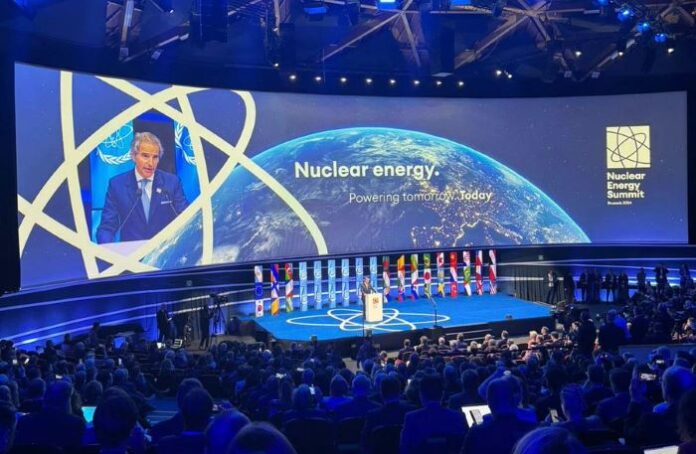Leaders from 30 countries, including 11 from the European Union, gathered in Brussels for the Nuclear Energy Summit, advocating for the use of nuclear energy in the bloc as a measure to push its energy efficiency and phase out carbon and other fossil fuels.
The summit was hosted in the Atomium, Brussels’ landmark of the Atomic Age built for the 1958 Expo and was chaired by Belgian Prime Minister Alexander De Croo and International Atomic Energy Agency (IAEA) Director General Rafael Mariano Grossi. CEOs, scientists and politicians attended the event. The EU countries present were Belgium, Bulgaria, Croatia, the Czech Republic, Finland, France, Hungary, Italy, the Netherlands, Poland and Sweden.
The EU countries signed a declaration that urges regulators in helping with securing financing projects for nuclear energy in order to build new nuclear plants and extend the lifeline of existing ones with proper financing. They also pledged to “enhance cooperation to enable timely deployment of advanced reactors.”
The recent energy crisis and the will to reach the EU’s ambitious climate targets sparkled the renewed interest in nuclear energy. The executive director of the International Energy Agency Fatih Birol said that “without the support of nuclear power we have no chance to reach our climate targets on time. Renewables will play the major role in terms of electricity, especially solar supported by wind and hydropower.”
Many EU leaders spoke on the need to pursue more nuclear energy and cooperation in the sector, including Commission president Ursula von der Leyen, who said that “governments need to step up support to ensure financing is available.”
French President Emmanuel Macron commented that “Our priority must be to get out of coal and gas and move towards nuclear power and renewable energy.”
Funding was cited as a crucial issue also by Swedish Prime Minister Ulf Kristersson, calling for government to “share financial risks and provide incentives and that multinational development banks join in.”
His sentiment was also shared by Croatian Prime Minister Andrej Plenkovic who asked the European Investment Bank and other financial institutions to help more and urged the EU to create a nuclear strategy to keep the bloc as a key player in fusion energy.
Similarly, Czech Prime Minister Petr Fiala also asked to add nuclear energy in future EU energy’s strategy.
De Croo envisaged a “comprehensive approach, embracing different energy sources” including nuclear energy alongside renewables. Nuclear energy remains a topic of debate within the EU.
Austria opposes it and recently denounced the Commission because it decided to add nuclear energy in its energy taxonomy, granting funding and tax breaks for developing and maintaining nuclear power plants.

